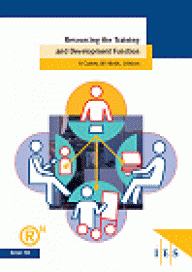Publications
 We author and publish a range of resources to keep you up to date with the latest developments in employment, labour market and human resource policy and practice.
We author and publish a range of resources to keep you up to date with the latest developments in employment, labour market and human resource policy and practice.
All our pdf publications are free to access.
-
📄
The 'Safe Learner': Exploring the Concept
Kerrin M, Silverman, Thomson L | Nov 2002 | Learning and Skills CouncilDeveloping and promoting the concept of the 'safe learner' was an important part of the Learning and Skills Council's approach to learner health and safety. This report was used to inform policy and promote good practice in health and safety on LSC funded programmes. This was achieved through, for example, identifying what characterises a 'safe learner' and how supervisors can encourage safe behaviours amongst learners.
-

Resourcing the Training and Development Function
Carter A, Hirsh W, Aston J | Oct 2002 | Institute for Employment StudiesThis study looks in some detail at how training and development was being organised and resourced in a range of large organisations across the private and public sectors. It also predicts some future changes in the patterns of resourcing training and development.
-

Knowledge Migrants
The motivation and experience of professionals in the UK on work permits
Pearson R, Morrell J | Oct 2002 | European CommissionThe Department of Trade and Industry and Home Office commissioned NOP Business and IES to explore the push and pull factors that affect the decision of skilled individuals to migrate to the UK. The study surveyed non-UK nationals from outside the European Economic Area who were recent arrivals in the UK, and working in four occupational categories that are part of global markets. This publication is no longer available.
-
📄
Key Indicators of Women's Position in Britain
Dench S, Aston J, Evans C, Meager N, Willison R, Williams M | Oct 2002 | Cabinet Office, Women and Equality UnitThe aim of this project was to identify a set of key indicators for mapping women's position relative to that of men across a wide range of areas, and to draw together reliable and robust statistics from different sources, to provide a comprehensive baseline for monitoring progress. It also outlined recent trends in these indicators, so future changes could be put into context. This publication is no longer available.
-
📄
Education Business Link Clusters Evaluation
Hillage J, Barry J, Pike G | Oct 2002 | Department for Education and SkillsIn September 2000, nine clusters (small groups) of schools were invited to work in partnership to develop joint approaches to education business link (EBL) activity, with the support of a specially appointed broker. A pilot cluster was established in each of the nine English regions. The pilots were funded for a total of two years to test the impact of a broker working with a specific cluster of schools - particularly in the areas of developing a progressive experience of the world at work from an early age up to pre-16 work experience and teacher placements. The Institute for Employment Studies (IES) was commissioned in September 2000 to develop a national evaluation framework and to use it to assess the value of the pilots. IES conducted a range of visits to the pilots, interviewing brokers and other intermediaries and representatives from schools and employers and held a series of workshops involving representatives from the pilots.
-

Kirkpatrick and Beyond
A review of models of training evaluation
Tamkin P, Yarnall J, Kerrin M | Sep 2002 | Institute for Employment StudiesThe literature is full of suggestions on approaches that regard the Kirkpatrick model as no longer adequate. This report looks critically at Kirkpatrick and the other models that purport to be significant improvements. It develops a model of the learning process to help underpin any approach to training evaluation, and reviews what we know about evaluation and the factors that affect training success.
-

Review of Existing Supporting Scientific Knowledge to Underpin Standards of Good Practice for Key Work-Related Stressors, Phase 1
Rick J, Thomson L, Briner R, O'Regan S, Daniels K | Sep 2002 | Health and Safety ExecutiveThis study was undertaken to identify the best available evidence on the ways in which nine stressors affect individuals at work.
-
📄
Higher Education: The Second Skills Foresight Report
Maginn A, Perryman S | Sep 2002 | Higher Education Staff Development AgencyThis report maps the higher education labour market, identifying trends where possible, with a particular focus on skills issues. It reviews evidence for the whole workforce, and specifically for the higher education workforce, drawing on data from the Labour Force Survey (2001), the IES/HESDA employer survey (staff, skills, training and development in 2001), and the IRS/UCEA employer survey (staff recruitment and retention, 2001). This publication is no longer available.
-
📄
An Assessment of Skill Needs in Post-16 Education and Training
Maginn A, Williams M | Aug 2002 | Department for Education and SkillsThis report summarised the most up-to-date information about skills issue in the post-16 education and training sector in 2002. In particular, it sought to draw together common themes that affect employers and employees working in further and higher education, community and adult education, training and workforce development.
-
📄
The Trainer as Executive Coach
Carter A | Aug 2002 | Institute for Employment StudiesThe business management press is regularly urging all executives to get themselves a coach or be left behind as the 'next big thing' in performance improvement rolls past. So what is executive coaching? How does executive coaching work from a coach's perspective? What makes a good executive coach? And how can trainers develop their skills in this area? Alison Carter provides the answers.
